2.3 Unit 2 Body language Grammar 课件(共36张PPT)
文档属性
| 名称 | 2.3 Unit 2 Body language Grammar 课件(共36张PPT) | 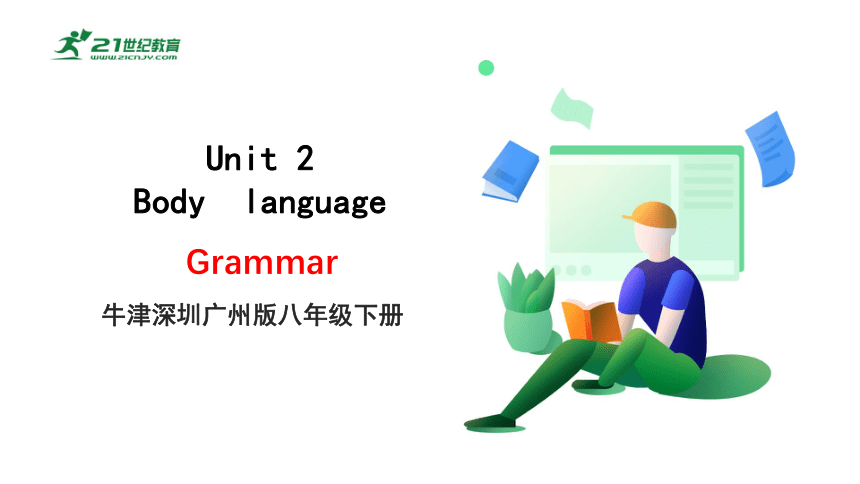 | |
| 格式 | pptx | ||
| 文件大小 | 6.3MB | ||
| 资源类型 | 试卷 | ||
| 版本资源 | 牛津深圳版 | ||
| 科目 | 英语 | ||
| 更新时间 | 2022-12-14 21:25:01 | ||
图片预览

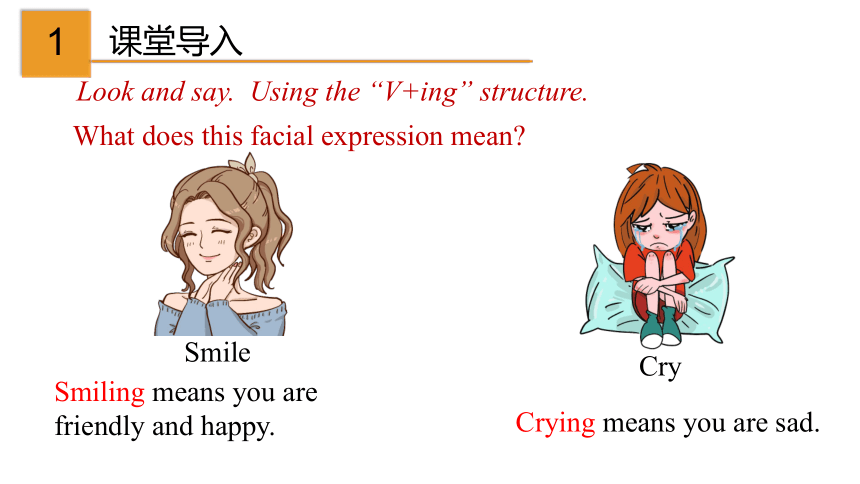
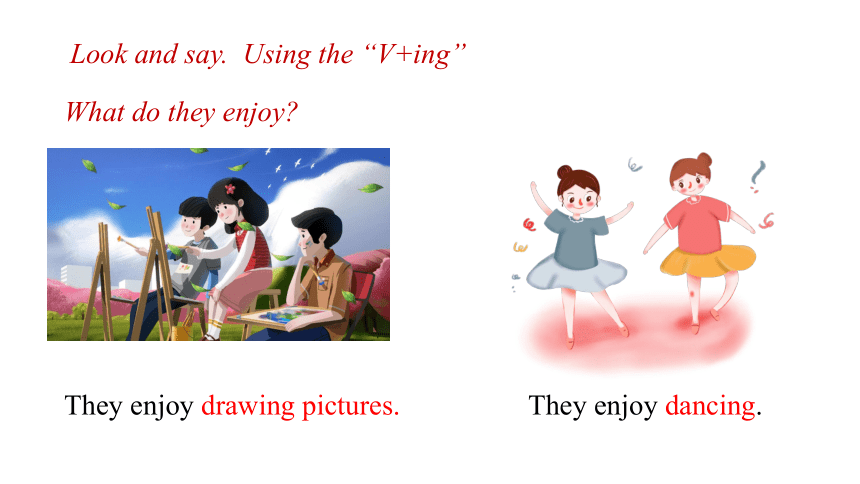
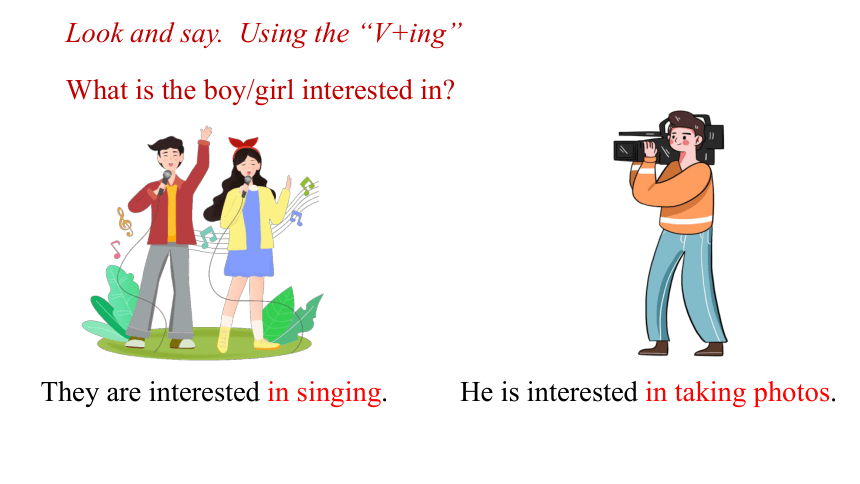
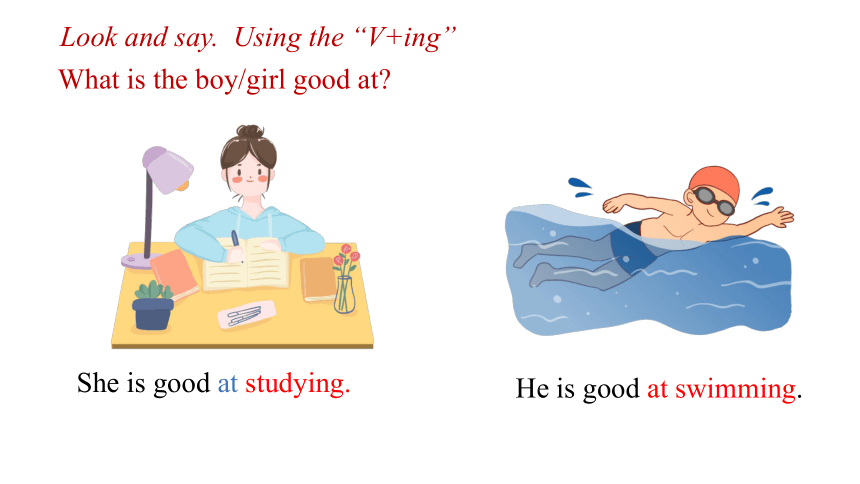

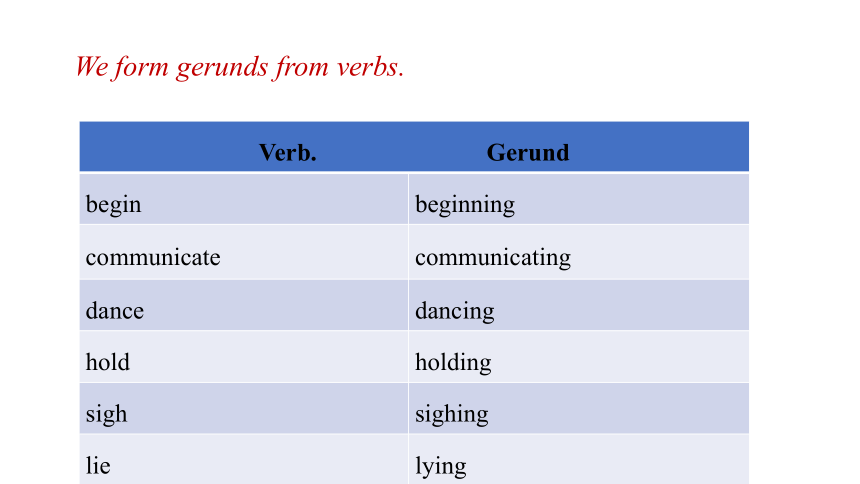

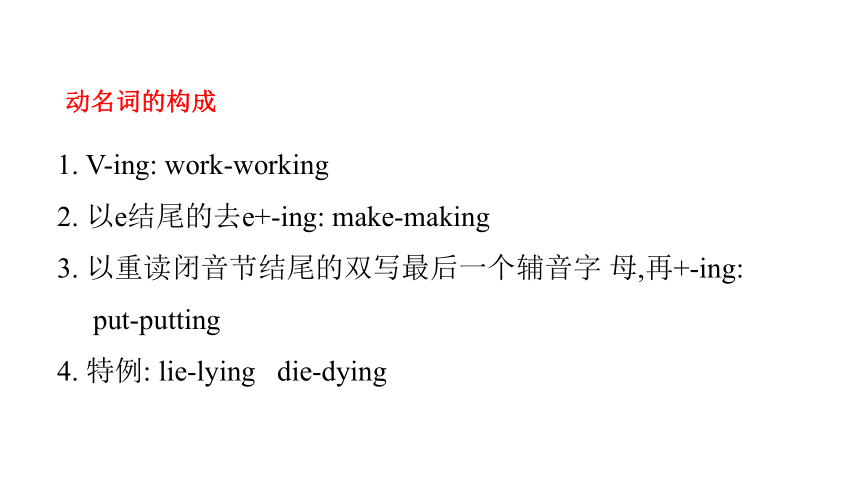
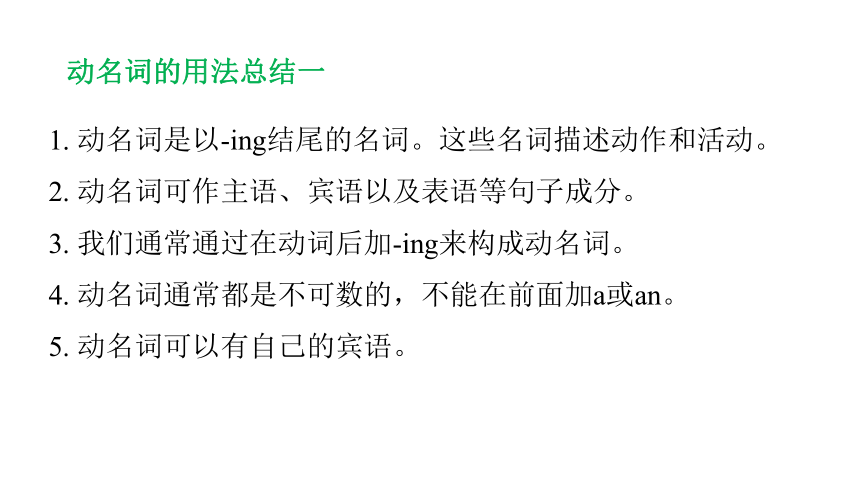
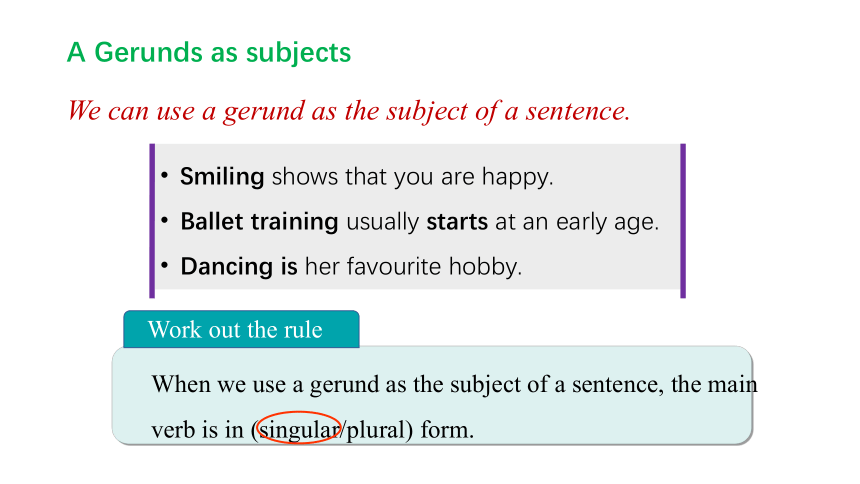
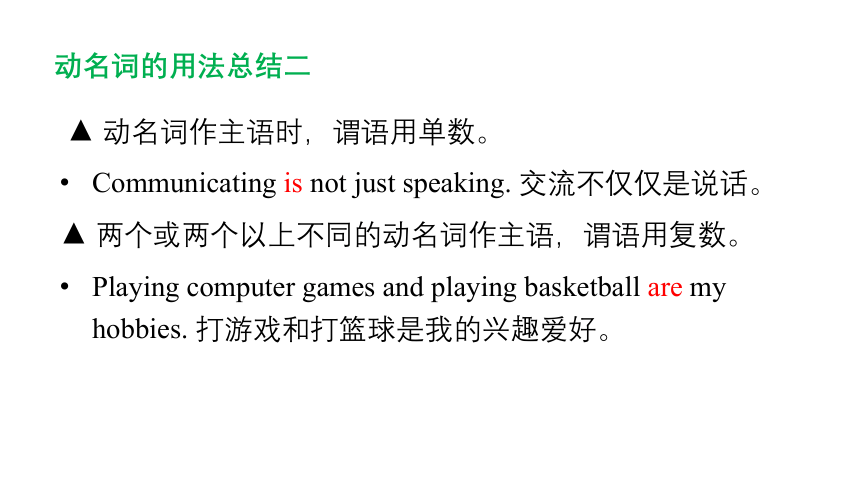
文档简介
(共36张PPT)
Unit 2
Body language
牛津深圳广州版八年级下册
Grammar
Look and say. Using the “V+ing” structure.
Smiling means you are friendly and happy.
Crying means you are sad.
Smile
Cry
What does this facial expression mean
1
课堂导入
What do they enjoy
They enjoy drawing pictures.
They enjoy dancing.
Look and say. Using the “V+ing”
What is the boy/girl interested in
They are interested in singing.
He is interested in taking photos.
Look and say. Using the “V+ing”
What is the boy/girl good at
She is good at studying.
He is good at swimming.
Look and say. Using the “V+ing”
Gerunds
Communicating is more than just speaking.
Gerunds are nouns ending in -ing. These nouns refer to actions and activities.
2
课堂活动
Verb. Gerund
begin beginning
communicate communicating
dance dancing
hold holding
sigh sighing
lie lying
We form gerunds from verbs.
Things to remember
Gerunds are often uncountable. We do not add a or an before them.
A gerund can have its own object.
Debbie loves reading poems.
We usually form a gerund by adding ________ to a (verb/noun).
Work out the rule
ing
1. V-ing: work-working
2. 以e结尾的去e+-ing: make-making
3. 以重读闭音节结尾的双写最后一个辅音字 母,再+-ing:
put-putting
4. 特例: lie-lying die-dying
动名词的构成
动名词的用法总结一
1. 动名词是以-ing结尾的名词。这些名词描述动作和活动。
2. 动名词可作主语、宾语以及表语等句子成分。
3. 我们通常通过在动词后加-ing来构成动名词。
4. 动名词通常都是不可数的,不能在前面加a或an。
5. 动名词可以有自己的宾语。
Smiling shows that you are happy.
Ballet training usually starts at an early age.
Dancing is her favourite hobby.
A Gerunds as subjects
We can use a gerund as the subject of a sentence.
When we use a gerund as the subject of a sentence, the main verb is in (singular/plural) form.
Work out the rule
▲ 动名词作主语时,谓语用单数。
Communicating is not just speaking. 交流不仅仅是说话。
▲ 两个或两个以上不同的动名词作主语,谓语用复数。
Playing computer games and playing basketball are my hobbies. 打游戏和打篮球是我的兴趣爱好。
动名词的用法总结二
S1: What can shaking your closed hand show
S2: Shaking your closed hand can show that you are angry.
shake your closed hand/angry
In pairs, ask and answer questions about the pictures. Follow the example.
rest your head on your hand/bored
S1: What can resting your head on your hand show
S2: Resting your head on your hand can show that you’re bored.
sigh/sad
S1: What can sighing show
S2: Sighing can show that you’re sad.
close your eyes/thinking
S1: What can closing your eyes show
S2: Closing your eyes can show that you’re thinking.
Debbie enjoys smiling and always looks friendly.
We often use gerunds after these verbs.
consider finish mind suggest
enjoy imagine practise
We can also use a gerund as the object of a sentence.
B Gerunds as objects
Things to remember
We often use gerunds after prepositions.
Debbie is good at communicating with people.
I am looking forward to going to Beijing.
1. 英语中有一些动词(短语)后面常接动名词作宾语。如:
enjoy(like, love) , suggest ,mind, finish, practise, deny,avoid,admit, keep, miss
He denied stealing my bike. 他否认偷了我的自行车。
2.介词后要使用动名词。
He is good at drawing pictures. 他善于画画。
动名词的用法总结三
3. 常见的“动词+介词+动名词”的短语有:prefer... to, be used to, look forward to , feel like, give up, keep on, insist on, succeed in等。
You must give up smoking at once. 你必须马上戒烟。
He doesn’t feel like doing his homework.
他不想做家庭作业。
4. 用于某些惯用法中。例如:
be busy doing sth “忙于做某事”
Mother is busy cooking dinner in the kitchen. 妈妈在厨房忙着做饭。
(2) be worth doing sth “值得做某事”
The book is worth reading. 这本书值得一读。
(3) It’s no use / good doing sth
“做……无用 / 无好处”
It’s no use going to him for help. 向他寻求帮助没有用。
In pairs, ask and answer questions about the pictures. Follow the example.
S1: What does the boy enjoy
S2: He enjoys reading books.
S1: What is the girl practising
S2: She is practising climbing mountains.
S1: What is the girl interested in
S2: She is interested in playing chess.
S1: What is the girl good at
S2: She is good at skiing.
动名词
1 动名词的基本形式:动词原形+ing;否定式:not +动词原形+ing。
2 动名词在句中的作用:
(1)作主语。如:Seeing is believing. 眼见为实。
注意:动名词作主语时,谓语动词用单数形式。
(2)作表语。如:Her Job is teaching English. 她的工作是教英语。
(3)作宾语。如:I like travelling very much. 我很喜欢旅游。
(4)作定语。如:This is our reading room. 这是我们的阅览室。
语 法 总结
3 习惯接动名词作宾语的动词有:enjoy, finish, imagine, keep, mind, practise等。如:
My sister enjoys playing tennis. 我姐姐喜欢打网球。
Do you mind opening the window 你介意开窗吗?
4 动名词也可以在短语动词和介词后作宾语,习惯接动名词作宾语的短语有:be afraid of, be busy, be good at, be interested in, be worth, feel like, how / what about, look forward to, pay attention to, succeed in, think of等。如:
Are you interested in playing chess 你对下象棋感兴趣吗?
I’m looking forward to visiting the Great Wall. 我盼望去参观长城。
5 接动词不定式或动名词均可且含义相同的动词有:begin, start, like, love, hate, prefer, continue等。接不定式多指具体的动作,接动名词多指一般或习惯行为。如:
He likes to sing / singing. 他喜欢唱歌。
It began to rain / raining. 开始下雨了。
6 以下动词接不定式和动名词意义大不相同:
stop to do something 停止手中事,去做另一件事
stop doing something 停止正在做的事
remember / forget / regret to do something
记得 / 忘记 / 遗憾要做某事(指动作尚未发生)
remember / forget / regret doing something
记得 / 忘记 / 遗憾做了某事(指动作已经发生)
try to do something 设法,努力去做,尽力
try doing something 试试去做,看有何结果
can’t help to do something 不能帮忙做
can’t help doing something 忍不住要做
go on to do something 接着做另外一件事
go on doing something 接着做同一件事
mean to do something 打算做,企图做
mean doing something 意思是,意味着
3
课堂小结
We have learned how to use gerunds.
三、单项选择
1. Jack practises ______ the piano for two hours every day.
A. play B. playing C. to play D. played
2. I didn’t finish _______ my homework until 11∶30 p.m. last night.
A. doing B. to do C. do D. did
3. Do you enjoy _______ these children, Mr Smith
A. teach B. taught C. to teach D. teaching
B
A
D
4
课堂练习
4. I’m sorry I forgot ______ the dictionary to you.
A. returned B. returning C. to return D. return
5. I don’t mind ______ some housework at home.
A. to do B. doing C. did D. do
6. All the children are looking forward to ______ the new cartoon.
A. watch B. watching C. watched D. watches
C
B
B
7. --Would you like______ camping with me
--I’d like to. But I’m busy______ my homework.
A. to go; to do B. to go; doing
C. going; to do D. going; doing
8. --Where is Mike
--I don’t know. But I saw him ____ football on the playground just now.
A. to play B. playing C. played D. plays
B
B
9. While we were running on the playground, Jack suddenly stopped _______ and lay on the ground, so we all stopped______ what was wrong with him.
A. to run; to see B. running; seeing
C. running; to see D. ran; seeing
10. Sarah, you’d better drink more water after ___ for such a long time.
A. run B. runs C. to run D. running
C
D
_________(take) a walk for a while after meals is good for our health.
She spends her time watching TV instead of ________(study).
It’s important _________finish) the work on time.
My father wasn’t happy, because I forgot ________(do) my homework.
In order to learn English well, you need to practice _______ (speak) English more and more.
You’d better _______(take) the medicine on time.
Lily couldn’t stop _______(cry) when she heard the bad news.
Taking
studying
to finish
to do
speaking
take
crying
三、用单词的适当形式填空
8. When you leave the office, please do not forget ________(turn) off the lights.
9. Please remind me about ________(buy) a present for my mother.
10. When I was a child, I once dreamt of ________(receive) a letter from the queen in the UK.
11. Do you have trouble ________(talk) to people with intellectual disabilities
12. My grandparents are used to _______(live) in the city now.
13. Do you mind my __________(smoke) here
to turn
buying
receiving
talking
living
smoking
14. A computer is very useful. But ________(chat) with others on the Internet wastes too much time.
15. When we saw him, the old man was busy ________(tie) the horse to the tree.
16. Keep ________(do) your homework, and you’ll finish it soon.
17. Look! People were busy ________(clean) the snow from the streets.
18.– What can we use computers for -- ________(send) e-mail.
19. ________(tell) your problems to your friends will help you feel better.
20.I remember ________ (tell) you about him that day.
chatting
tying
doing
cleaning
Sending
Telling
telling
谢谢
21世纪教育网(www.21cnjy.com)
中小学教育资源网站
兼职招聘:
https://www.21cnjy.com/recruitment/home/admin
Unit 2
Body language
牛津深圳广州版八年级下册
Grammar
Look and say. Using the “V+ing” structure.
Smiling means you are friendly and happy.
Crying means you are sad.
Smile
Cry
What does this facial expression mean
1
课堂导入
What do they enjoy
They enjoy drawing pictures.
They enjoy dancing.
Look and say. Using the “V+ing”
What is the boy/girl interested in
They are interested in singing.
He is interested in taking photos.
Look and say. Using the “V+ing”
What is the boy/girl good at
She is good at studying.
He is good at swimming.
Look and say. Using the “V+ing”
Gerunds
Communicating is more than just speaking.
Gerunds are nouns ending in -ing. These nouns refer to actions and activities.
2
课堂活动
Verb. Gerund
begin beginning
communicate communicating
dance dancing
hold holding
sigh sighing
lie lying
We form gerunds from verbs.
Things to remember
Gerunds are often uncountable. We do not add a or an before them.
A gerund can have its own object.
Debbie loves reading poems.
We usually form a gerund by adding ________ to a (verb/noun).
Work out the rule
ing
1. V-ing: work-working
2. 以e结尾的去e+-ing: make-making
3. 以重读闭音节结尾的双写最后一个辅音字 母,再+-ing:
put-putting
4. 特例: lie-lying die-dying
动名词的构成
动名词的用法总结一
1. 动名词是以-ing结尾的名词。这些名词描述动作和活动。
2. 动名词可作主语、宾语以及表语等句子成分。
3. 我们通常通过在动词后加-ing来构成动名词。
4. 动名词通常都是不可数的,不能在前面加a或an。
5. 动名词可以有自己的宾语。
Smiling shows that you are happy.
Ballet training usually starts at an early age.
Dancing is her favourite hobby.
A Gerunds as subjects
We can use a gerund as the subject of a sentence.
When we use a gerund as the subject of a sentence, the main verb is in (singular/plural) form.
Work out the rule
▲ 动名词作主语时,谓语用单数。
Communicating is not just speaking. 交流不仅仅是说话。
▲ 两个或两个以上不同的动名词作主语,谓语用复数。
Playing computer games and playing basketball are my hobbies. 打游戏和打篮球是我的兴趣爱好。
动名词的用法总结二
S1: What can shaking your closed hand show
S2: Shaking your closed hand can show that you are angry.
shake your closed hand/angry
In pairs, ask and answer questions about the pictures. Follow the example.
rest your head on your hand/bored
S1: What can resting your head on your hand show
S2: Resting your head on your hand can show that you’re bored.
sigh/sad
S1: What can sighing show
S2: Sighing can show that you’re sad.
close your eyes/thinking
S1: What can closing your eyes show
S2: Closing your eyes can show that you’re thinking.
Debbie enjoys smiling and always looks friendly.
We often use gerunds after these verbs.
consider finish mind suggest
enjoy imagine practise
We can also use a gerund as the object of a sentence.
B Gerunds as objects
Things to remember
We often use gerunds after prepositions.
Debbie is good at communicating with people.
I am looking forward to going to Beijing.
1. 英语中有一些动词(短语)后面常接动名词作宾语。如:
enjoy(like, love) , suggest ,mind, finish, practise, deny,avoid,admit, keep, miss
He denied stealing my bike. 他否认偷了我的自行车。
2.介词后要使用动名词。
He is good at drawing pictures. 他善于画画。
动名词的用法总结三
3. 常见的“动词+介词+动名词”的短语有:prefer... to, be used to, look forward to , feel like, give up, keep on, insist on, succeed in等。
You must give up smoking at once. 你必须马上戒烟。
He doesn’t feel like doing his homework.
他不想做家庭作业。
4. 用于某些惯用法中。例如:
be busy doing sth “忙于做某事”
Mother is busy cooking dinner in the kitchen. 妈妈在厨房忙着做饭。
(2) be worth doing sth “值得做某事”
The book is worth reading. 这本书值得一读。
(3) It’s no use / good doing sth
“做……无用 / 无好处”
It’s no use going to him for help. 向他寻求帮助没有用。
In pairs, ask and answer questions about the pictures. Follow the example.
S1: What does the boy enjoy
S2: He enjoys reading books.
S1: What is the girl practising
S2: She is practising climbing mountains.
S1: What is the girl interested in
S2: She is interested in playing chess.
S1: What is the girl good at
S2: She is good at skiing.
动名词
1 动名词的基本形式:动词原形+ing;否定式:not +动词原形+ing。
2 动名词在句中的作用:
(1)作主语。如:Seeing is believing. 眼见为实。
注意:动名词作主语时,谓语动词用单数形式。
(2)作表语。如:Her Job is teaching English. 她的工作是教英语。
(3)作宾语。如:I like travelling very much. 我很喜欢旅游。
(4)作定语。如:This is our reading room. 这是我们的阅览室。
语 法 总结
3 习惯接动名词作宾语的动词有:enjoy, finish, imagine, keep, mind, practise等。如:
My sister enjoys playing tennis. 我姐姐喜欢打网球。
Do you mind opening the window 你介意开窗吗?
4 动名词也可以在短语动词和介词后作宾语,习惯接动名词作宾语的短语有:be afraid of, be busy, be good at, be interested in, be worth, feel like, how / what about, look forward to, pay attention to, succeed in, think of等。如:
Are you interested in playing chess 你对下象棋感兴趣吗?
I’m looking forward to visiting the Great Wall. 我盼望去参观长城。
5 接动词不定式或动名词均可且含义相同的动词有:begin, start, like, love, hate, prefer, continue等。接不定式多指具体的动作,接动名词多指一般或习惯行为。如:
He likes to sing / singing. 他喜欢唱歌。
It began to rain / raining. 开始下雨了。
6 以下动词接不定式和动名词意义大不相同:
stop to do something 停止手中事,去做另一件事
stop doing something 停止正在做的事
remember / forget / regret to do something
记得 / 忘记 / 遗憾要做某事(指动作尚未发生)
remember / forget / regret doing something
记得 / 忘记 / 遗憾做了某事(指动作已经发生)
try to do something 设法,努力去做,尽力
try doing something 试试去做,看有何结果
can’t help to do something 不能帮忙做
can’t help doing something 忍不住要做
go on to do something 接着做另外一件事
go on doing something 接着做同一件事
mean to do something 打算做,企图做
mean doing something 意思是,意味着
3
课堂小结
We have learned how to use gerunds.
三、单项选择
1. Jack practises ______ the piano for two hours every day.
A. play B. playing C. to play D. played
2. I didn’t finish _______ my homework until 11∶30 p.m. last night.
A. doing B. to do C. do D. did
3. Do you enjoy _______ these children, Mr Smith
A. teach B. taught C. to teach D. teaching
B
A
D
4
课堂练习
4. I’m sorry I forgot ______ the dictionary to you.
A. returned B. returning C. to return D. return
5. I don’t mind ______ some housework at home.
A. to do B. doing C. did D. do
6. All the children are looking forward to ______ the new cartoon.
A. watch B. watching C. watched D. watches
C
B
B
7. --Would you like______ camping with me
--I’d like to. But I’m busy______ my homework.
A. to go; to do B. to go; doing
C. going; to do D. going; doing
8. --Where is Mike
--I don’t know. But I saw him ____ football on the playground just now.
A. to play B. playing C. played D. plays
B
B
9. While we were running on the playground, Jack suddenly stopped _______ and lay on the ground, so we all stopped______ what was wrong with him.
A. to run; to see B. running; seeing
C. running; to see D. ran; seeing
10. Sarah, you’d better drink more water after ___ for such a long time.
A. run B. runs C. to run D. running
C
D
_________(take) a walk for a while after meals is good for our health.
She spends her time watching TV instead of ________(study).
It’s important _________finish) the work on time.
My father wasn’t happy, because I forgot ________(do) my homework.
In order to learn English well, you need to practice _______ (speak) English more and more.
You’d better _______(take) the medicine on time.
Lily couldn’t stop _______(cry) when she heard the bad news.
Taking
studying
to finish
to do
speaking
take
crying
三、用单词的适当形式填空
8. When you leave the office, please do not forget ________(turn) off the lights.
9. Please remind me about ________(buy) a present for my mother.
10. When I was a child, I once dreamt of ________(receive) a letter from the queen in the UK.
11. Do you have trouble ________(talk) to people with intellectual disabilities
12. My grandparents are used to _______(live) in the city now.
13. Do you mind my __________(smoke) here
to turn
buying
receiving
talking
living
smoking
14. A computer is very useful. But ________(chat) with others on the Internet wastes too much time.
15. When we saw him, the old man was busy ________(tie) the horse to the tree.
16. Keep ________(do) your homework, and you’ll finish it soon.
17. Look! People were busy ________(clean) the snow from the streets.
18.– What can we use computers for -- ________(send) e-mail.
19. ________(tell) your problems to your friends will help you feel better.
20.I remember ________ (tell) you about him that day.
chatting
tying
doing
cleaning
Sending
Telling
telling
谢谢
21世纪教育网(www.21cnjy.com)
中小学教育资源网站
兼职招聘:
https://www.21cnjy.com/recruitment/home/admin
同课章节目录
